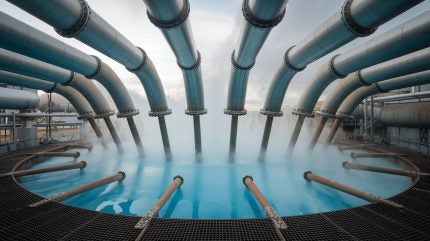
India’s Union Ministry of New and Renewable Energy (MNRE) has unveiled the National Policy on Geothermal Energy, introducing a framework to develop the country’s largely untapped geothermal resources.
The policy is designed to complement the country’s renewable energy mix, strengthen baseload supply and support India’s commitment to achieving net-zero emissions by 2070.

Discover B2B Marketing That Performs
Combine business intelligence and editorial excellence to reach engaged professionals across 36 leading media platforms.
Geothermal energy, which harnesses heat stored within the Earth’s crust, is positioned as an important addition to India’s renewable portfolio, which is currently dominated by solar, wind, bioenergy, and hydropower.
The technology offers aquaculture, cold storage, cooling, direct-use applications such as heating, electricity generation, food processing and geo-tourism.
The Geological Survey of India (GSI) has identified 381 hot springs across the country with surface temperatures between 35°C and 89°C, while Himalayan resources can reach nearly 200°C.
These resources fall within 13 geothermal provinces, namely the Andaman & Nicobar Islands, Arunachal Pradesh, Chhattisgarh, Gujarat, Himachal Pradesh, Jharkhand, Ladakh, Maharashtra, Odisha, Sikkim, Telangana, Uttarakhand and West Bengal.

US Tariffs are shifting - will you react or anticipate?
Don’t let policy changes catch you off guard. Stay proactive with real-time data and expert analysis.
By GlobalDataSome of the notable potential sites include Puga and Chumathang in Ladakh, Manikaran in Himachal Pradesh, Joshimath in Uttarakhand, Bakreshwar in West Bengal, Dholera in Gujarat and Tattapani in Chhattisgarh.
The policy also envisions the creation of a geothermal data repository through collaboration with the Ministry of Mines, Directorate General of Hydrocarbons, National Data Repository, CSIR-NGRI and other agencies.
Geothermal heating and cooling technologies, particularly ground source heat pumps, are also proposed, to be integrated into the National Building Code.
To foster innovation, the policy promotes research and development in the areas of hybrid geothermal-solar plants, the retrofitting of abandoned oil wells, and the implementation of enhanced and advanced geothermal systems.
For implementation, the MNRE will serve as the nodal ministry and will work with international partners and multilateral institutions to establish pilot projects under the Renewable Energy Research and Technology Development Programme.
The ministry will issue detailed guidelines, standard operating procedures and periodic progress reports.
In its initial phase, the MNRE has approved five projects aimed at pilot demonstrations and resource evaluation.





